

A List of Psychological Disorders. Anxiety disorders are those that are characterized by excessive and persistent fear, worry, anxiety and related behavioral disturbances.5 Fear involves an emotional response to a threat, whether that threat is real or perceived. Anxiety involves the anticipation that a future threat may arise. Types of anxiety disorders include: Generalized Anxiety Disorder (GAD) This disorder is marked by excessive worry about everyday events. Common Psychological Disorders in Singapore. 6 common mental disorders affecting Singaporeans today and where you can go to get help, Business Insider - Business Insider Singapore.
Pexels There’s been an increase in the number of Singapore adults who have suffered from a mental disorder in their lifetimes, the Institute of Mental Health (IMH) said recently. According to a 2016 study, one in seven people in Singapore have experienced specific mood, anxiety, or alcohol use disorders in their lifetime, up from roughly one in eight six years prior.
Read also: 1 in 7 people in Singapore have experienced a mental disorder – and some millennials are more susceptible to mood and alcohol-related ones Part of the study’s findings is the alarming revelation that most of these sufferers (more than three-quarters) have never sought any professional help for their illnesses. Where to get help. Major depressive disorder. Depression; a mental disorder of low mood, self-esteem or energy Typically, people are treated with counseling and antidepressant medication.[1] Medication appears to be effective, but the effect may only be significant in the most severely depressed.[13][14] It is unclear whether medications affect the risk of suicide.[15] Types of counseling used include cognitive behavioral therapy (CBT) and interpersonal therapy.[1][16] If other measures are not effective, electroconvulsive therapy (ECT) may be considered.[1] Hospitalization may be necessary in cases with a risk of harm to self and may occasionally occur against a person's wishes.[17] Signs and symptoms.
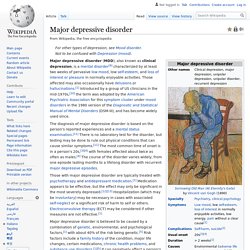
Alcohol abuse. Alcohol abuse encompasses a spectrum of unhealthy alcohol drinking behaviors, ranging from binge drinking to alcohol dependence.
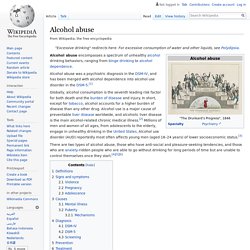
Alcohol abuse was a psychiatric diagnosis in the DSM-IV, and has been merged with alcohol dependence into alcohol use disorder in the DSM-5.[1] Globally, alcohol consumption is the seventh leading risk factor for both death and the burden of disease and injury. In short, except for tobacco, alcohol accounts for a higher burden of disease than any other drug. Alcohol use is a major cause of preventable liver disease worldwide, and alcoholic liver disease is the main alcohol-related chronic medical illness.[2] Millions of men and women of all ages, from adolescents to the elderly, engage in unhealthy drinking in the United States. Alcohol use disorder (AUD) reportedly most often affects young men (aged 18–24 years) of lower socioeconomic status.[3] OCD one of the most common mental disorders in Singapore. SINGAPORE: Obsessive compulsive disorder (OCD) is one of most common mental health conditions here, according to findings from a nationwide study released on Tuesday (Dec 11).
The disorder affected one in 28 people in their lifetime, making it the third-most prevalent condition after major depressive disorder and alcohol abuse. The illness is commonly characterised by recurrent and persistent thoughts, impulses or images, and when severe, impedes a person's ability to function. Younger people aged 18 to 34 were more likely to have the condition than those aged 50 and above, said researchers from the Institute of Mental Health (IMH) and Nanyang Technological University (NTU), citing the findings from the second Singapore Mental Health Study. The study also found that those who had a monthly household income of between S$2,000 and S$3,999 were less likely to have the condition than those with a household income of less than S$2,000.
“It’s a very neglected disorder,” said Assoc Prof Mythily. Generalized anxiety disorder. Overview It's normal to feel anxious from time to time, especially if your life is stressful. However, excessive, ongoing anxiety and worry that are difficult to control and interfere with day-to-day activities may be a sign of generalized anxiety disorder. It's possible to develop generalized anxiety disorder as a child or an adult. Generalized anxiety disorder has symptoms that are similar to panic disorder, obsessive-compulsive disorder and other types of anxiety, but they're all different conditions.
Living with generalized anxiety disorder can be a long-term challenge. Generalized anxiety disorder care at Mayo Clinic Symptoms Generalized anxiety disorder symptoms can vary. Physical signs and symptoms may include: Psychiatrist Singapore. Worries, anxious feelings, fears, muscle tension, stress, fatigue, phobias, panic attacks, social anxiety Anxiety is a normal emotional state or reaction to stress.
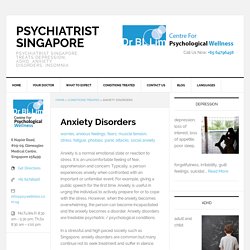
It is an uncomfortable feeling of fear, apprehension and concern. Typically, a person experiences anxiety when confronted with an important or unfamiliar event. For example, giving a public speech for the first time. Anxiety is useful in urging the individual to actively prepare for or to cope with the stress. In a stressful and high paced society such as Singapore, anxiety disorders are common but many continue not to seek treatment and suffer in silence. Anxiety Disorders include: Generalised Anxiety Disorder (GAD)Panic Disorder (with or without Agoraphobia)Post-traumatic Stress Disorder (PTSD)Obsessive Compulsive Disorder (OCD)Social PhobiaSpecific PhobiaTreatment of Anxiety Disorders. Bipolar disorder. Bipolar disorder, also known as bipolar affective disorder (and originally called manic-depressive illness), is a mental disorder characterized by periods of elevated mood and periods of depression.[1][2] The elevated mood is significant and is known as mania or hypomania depending on the severity or whether there is psychosis.
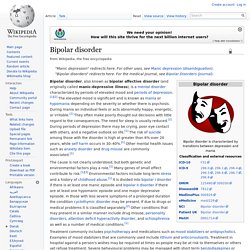
During mania an individual feels or acts abnormally happy, energetic, or irritable.[1] They often make poorly thought out decisions with little regard to the consequences. The need for sleep is usually reduced.[2] During periods of depression there may be crying, poor eye contact with others, and a negative outlook on life.[1] The risk of suicide among those with the disorder is high at greater than 6% over 20 years, while self harm occurs in 30–40%.[1] Other mental health issues such as anxiety disorder and drug misuse are commonly associated.[1]
Am I alcohol dependent? If you find it difficult to enjoy yourself or relax without having a drink, it’s possible you’ve become dependent on alcohol.
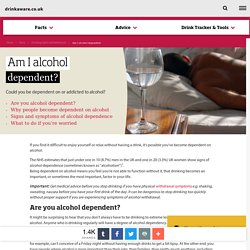
The NHS estimates that just under one in 10 (8.7%) men in the UK and one in 20 (3.3%) UK women show signs of alcohol dependence (sometimes known as “alcoholism”)1.Being dependent on alcohol means you feel you’re not able to function without it, that drinking becomes an important, or sometimes the most important, factor in your life. Important: Get medical advice before you stop drinking if you have physical withdrawal symptoms e.g. shaking, sweating, nausea before you have your first drink of the day. It can be dangerous to stop drinking too quickly without proper support if you are experiencing symptoms of alcohol withdrawal. Are you alcohol dependent? It might be surprising to hear that you don’t always have to be drinking to extreme levels to become dependent on alcohol.
Take our Alcohol Self Assessment test to find out if you're drinking too much. Drinkchat. Alcohol Abuse vs. Alcohol Dependence. Alcohol abuse is any "harmful use" of alcohol but is that the same as alcohol dependence? These two terms are not the same. While an alcohol abuser is prone to binge drinking, someone who is dependent on alcohol exhibits a variety of other symptoms. Who Is an Alcohol Abuser? The Diagnostic and Statistical Manual of Mental Disorders IV describes alcohol abusers as those who continue to drink despite recurrent social, interpersonal, and legal problems as a result of their alcohol use. Harmful use implies their drinking causes either physical or mental damage.
Common Social Stigmas in Singapore. Let’s end stigma of mental illness. With the recent highlight of mental illness in our society, we need to start asking if we are doing enough to understand and treat mental illness in Singapore. Perhaps the first step would be to address the stigma against mental illness. Singapore Mental Health Film Festival 2019. A Social Experiment on Mental Health Stigma. 3. On the social stigma faced by those with mental illnesses (SIT Ministerial Forum 2016) Understanding the Stigma Around Mental Illness. Anyone who has had experience with mental illness, personally or professionally, can tell you that despite advances in psychiatry and psychology, there is a great deal of stigma that remains.
One needs to only think of the book and movie One Flew Over the Cuckoo's Nest to get a feel for that stigma. The field of mental health has made some distance since that time, but the stigma continues to be a reality. Types of Stigma The stigma associated with mental illness can be divided into two types: social stigma, which involves the prejudiced attitudes that others have around mental illness; and self-perceived stigma, which involves an internalized stigma that the person with the mental illness suffers from. Both are very real. Understanding Mental Health in Singapore. Speak Up. Speak Up (Ms Peirong) How to Help Someone with Mental Health Problems.
Mental health is a serious issue in the United States and the Centers for Disease Control and Prevention (CDC) estimate as much as 25 percent of the American population has some form of mental illness. If you or a loved one is dealing with the effects of a mental illness, it can be difficult to find the right information or know what to do next. Understanding mental illness in its various forms is the best way to start. Understanding Mental Health Problems Mental health problems take a toll not only on those directly affected, but on friends and family members as well.
Getting Help for Mental Illness. Take Action If you think that you, or someone you’re close to, might have mental health problems, you’ve already taken the first step, which is to notice that something doesn’t seem right.
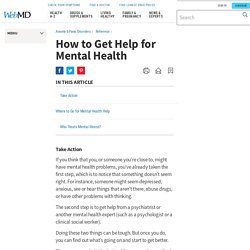
For instance, someone might seem depressed, anxious, see or hear things that aren’t there, abuse drugs, or have other problems with thinking. The second step is to get help from a psychiatrist or another mental health expert (such as a psychologist or a clinical social worker). Doing these two things can be tough. But once you do, you can find out what’s going on and start to get better. The sooner you do it, the better. Where to Go for Mental Health Help If it’s an emergency -- for instance, someone is suicidal or in a crisis -- call 911. If it’s not an emergency, start with your regular doctor. If you have health insurance, find out what your plan covers. How to Help a Loved One with a Mental Illness. Source: article continues after advertisementWhen a loved one has a psychiatric disorder, it’s a challenge for the whole family: parents, siblings, friends and relatives.
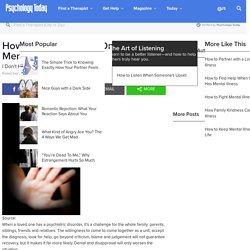
The willingness to come to come together as a unit, accept the diagnosis, look for help, go beyond criticism, blame and judgement will not guarantee recovery, but it makes it far more likely. Denial and disapproval will only worsen the situation.